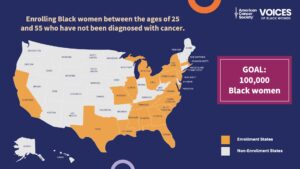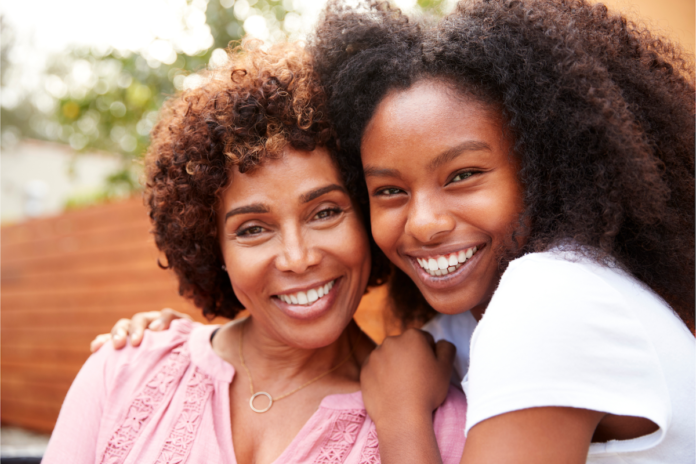The announcement was all over the news: The American Cancer Society, the VOICES of Black Women, the largest population study focused solely on Black women and cancer. But how will it work? We talked to two Principal Investigators on the study leadership team, Drs. Lauren E. McCullough and Alpa V. Patel, about how the study works, what is involved commitment-wise, how one qualifies, what study participants can expect, how this study differs from a clinical trial or intervention, and what they will do with the learnings they will receive from this study.
Finding Out What is Relevant For Us.
In approaching this study, researchers knew that persistent disparities exist when it comes to our health, particularly in cancer diagnosis and Black women. “In having a population of all Black women, we can understand what’s driving better outcomes for some Black women, less great outcomes for other black women. That way, as we partner with patient outreach and support and our local and national leaders, we can develop interventions that will be relevant for Black women,” Dr. McCullough says. “Often, when we think about disparities, we think about the reference or comparator group being white women. But by augmenting this population, we can better understand what works for us and what works for our health, and help drive interventions that will be relevant.”
This a 30 Year Study
The goal is to enroll over 100,000 women. This is not the most extensive study of Black women. But it will be the most extensive study to have Black women focused on cancer. To start, they are looking for Black women between the ages of 25-55 who have never been diagnosed with cancer (skin cancer is the only exception). Potential participants fill out a pretty comprehensive questionnaire, so they find out about your lived experience.
Dr. McCullough provides more details. “You will complete a short registration survey to get your demographic characteristics, name, address, phone number, and email. And that’s so we can keep up with you over the time you’re in the study for the next 30 years. That entire process takes about 10 or 15 minutes.,” she explains.
“After that, you would complete the first life and health histories survey, which takes about an hour, and some of the usual things you would expect in a health survey, previous medical conditions and family history; we’d also ask about lifestyle and behavior. Physical activity, diet environment, or food environment, we’d ask about your sleep. And then, there are several questions that we think are specific to this demographic group, including social support and caregiving, mental health, and experiences of racism and discrimination. And that survey, again, takes about an hour, and you’ll be fully enrolled in the study.” However, the health history is designed to be self-paced so participants can return to finish it when their schedules permit.
“Over time, we follow the population for all health outcomes, including cancer. So we’re able to understand then how all of these different things that someone may be exposed to, through their environment, their lifestyle, their job, their family, or medical, personal medical history, and so on, as well as other social and structural aspects, how all of these different factors may influence the risk of developing different types of health outcomes,” Dr. Patel explains, “Then we keep following the populations. So, for instance, if a woman is diagnosed with cancer, we don’t stop following her; we continue to follow the population for potentially the next 30 years, really to be able to understand how also to improve outcomes after a cancer or other disease diagnosis.”
You Don’t Have to Go Anywhere
You can participate in the Voices of Black Women study from the privacy of your home. You never have to go anywhere. “It is not a clinical trial. It is not an intervention,” Dr. McCullough says. “We just want to know about you, your experiences, your lifestyle, and then we can link that with various health outcomes that will emerge throughout the study.”
Dr. McCullough notes that over 30 years, the study researchers will reach out to participants twice a year to complete a 30-minute survey. And that’s it. “So an hour investment every year is what we’re looking for when we partner with Black women, and having this information on this number of women can help augment the research in health and cancer for Black women,” she says.
They Are Recruiting in 20 States
Recruitment is already underway, according to Dr. Patel.”We are recruiting right now across 20 states, including the District of Columbia. These 20 states and D.C. represent where over 90% of the Black population in the United States lives,” she says.
The States include Alabama, California, Florida, Georgia, Illinois, Louisiana, Maryland, Massachusetts, Michigan, Mississippi, Missouri, New Jersey, New York, North Carolina, Ohio, Pennsylvania, South Carolina, Tennessee, Texas, Virginia, and Washington, D.C.

Researchers Want to Build a Bidirectional Relationship
Dr. Patel says that this study is building upon previous studies. “So, an important thing for us has been and will continue to be for voices of Black women to share what we learned from the study. The more our participants feel connected to the discoveries we’re making to inform their health and understand their impact on a much greater scale, the more important it is to us,” she says. “We plan to build a bidirectional relationship through that participant portal. This is not something that we want women who choose to participate to feel like they are doing for us. But this is something they are doing with us. We will share findings as we uncover them over the next 30 years with our study participants.”
What They Hope to Learn
Dr. McCullough says, “I think we hope to learn why Black women are getting more aggressive types of disease. Cancer relatively impacts Black and white women pretty equally. But we know Black women are more likely to be diagnosed with tumors that are harder to treat, as well as late-stage tumors,” she says. “Even though for breast cancer, for example, Black women are equally likely to get screened as their white counterparts. And so, trying to get more insights on why this is the way we can tailor our prevention messages would be another goal. And then, finally, why Black women tend to die more or less often than other counterparts. And again, that we’re focused on Black women. But I think we can glean nice insights from understanding which participants, you know, survive longer. Are there things that they’re doing differently? Are there different systems that they’re operating in that better attend to their social needs? But certainly, some early insights will hopefully begin to narrow those gaps and create optimal health for all Black women.”
To enroll in VOICES of Black Women, go here.
If you still have questions about the program, check out the FAQs here.






